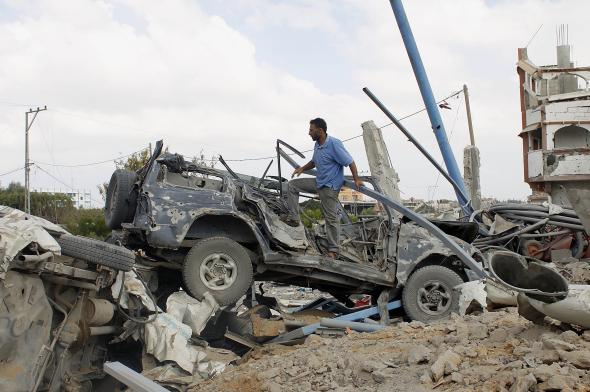A 72-hour truce went into effect at 8 a.m. today in Gaza, shortly after a final flurry of Hamas rocket attacks and Israeli airstrikes. Israeli ground troops are now withdrawing from the area.
Given that at least five proposed or accepted cease-fires have fallen apart during this three-week conflict, some skepticism is understandable, and indeed Israeli military commanders have made clear that the operation could be restarted at any time.
While it never pays to be too optimistic in this part of the world, there’s reason to believe this time could be different. Last week I wrote that any internationally negotiated cease-fire agreement would be irrelevant until Israel decided its military goals had been achieved. As Reuters reports, that seems to have happened:
Israeli armour and infantry withdrew from the Gaza Strip ahead of the truce, with a military spokesman saying their main goal of destroying cross-border infiltration tunnels had been completed. “Mission accomplished,” the military tweeted.
Signs point to Hamas also concluding that there’s nothing more to gain from fighting. Rocket fire into Israel had substantially diminished in the days leading up to the truce and, as the New York Times points out, the group has now agreed to an Egyptian-backed truce that is similar to “one that they had rejected earlier in the conflict.”
With nearly 2,000 Palestinians killed and Gaza’s infrastructure devastated, it would be hard to construe this as a victory for Hamas, which seems unlikely at this point to accomplish its earlier stated goal of ending Israel’s blockade of Gaza. The group may have to content itself with having demonstrated it can seriously disrupt Israel’s economy with its long-range rockets. Hamas has also succeeded in increasing Israel’s international political isolation. (This morning a senior member of the British Foreign Office resigned over David Cameron’s failure to condemn Israel actions.)
The Egyptian government is pushing to restart talks in Cairo, but the more important factor to watch right now is whether the two sides voluntarily hold their fire. There’s also an extremely high risk at the moment of violence spreading beyond Gaza in Israel or the West Bank.
